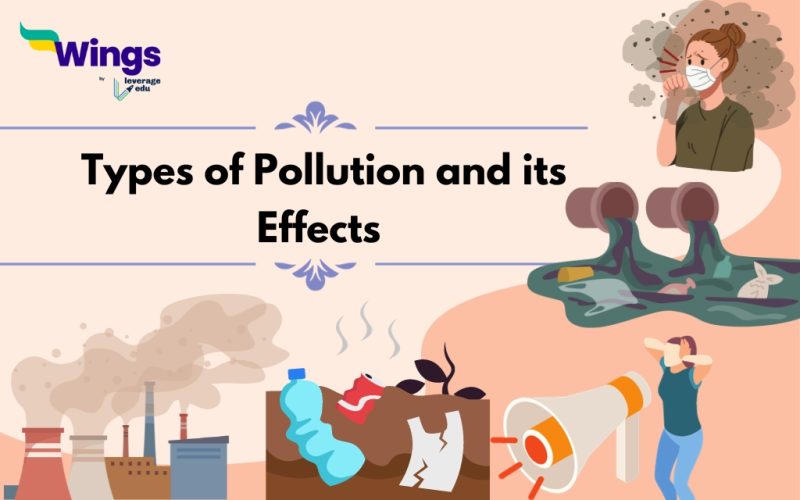Pollution is a condition when you can witness a drastic change in the environment. With the growing pollution and high demand for natural resources, humans are degrading the quality of the environment. This is creating continuous depletion of natural resources such as air, water, soil, etc. The introduction of contaminants or pollutants into the environment is known as pollution. The introduction of chemical substances, particulate matter or foreign substances pollutes the ecological balance. There are different types of pollution that affect the resources. Stay tuned and continue reading this article to learn about various types of pollution and their effects!
Also Read: Pollution of Air and Water
What is Pollution?
Pollution refers to the contamination of the environment or natural resources due to the introduction of pollutants into the environment. It is not necessarily important that pollution is caused by chemicals, sometimes forms of energy i.e. sound, light, or heat could be the source of pollution.
A small amount of pollution can also be harmful and create disturbance in the ecological balance. This would eventually affect the food chain and human health.
Also Read: How to Prepare for UPSC in 6 Months?
Also Read: Essay on Save Trees
Types of Pollution
There are different types of pollution caused by pollutants, through human intervention, or through natural calamities. Mentioned below are the types of pollution:
- Air Pollution
- Water Pollution
- Soil Pollution
- Noise Pollution
- Radioactive Pollution
Apart from these mentioned pollution, there are many other pollution which are affecting the natural resources of the earth and degrading the quality of life.
Also Read: Essay on Environmental Pollution
Air Pollution
Air pollution is defined as the release of harmful materials into air. Harmful materials refer to pollutants, particulate matter, chemicals, or toxic gases. Air Pollution needs to be checked regularly by measuring the AQI level. Nowadays with the increasing population, you can witness extreme smog in the environment and very high AQI. The pollutants released from vehicles, and industries are contamination the air causing air pollution. Air pollution is one of the leading causes of health issues related to the respiratory system.
Here are some effects of air pollution:
- Air pollution leads to heart disorders and respiratory illness
- Increases the risk of cancer due to the depletion of the ozone layer
- Increased risk of skin diseases
- Causes Global warming due to increased levels of carbon dioxide and other harmful gases in the atmosphere
- Acid rain
- Ozone depletion
- Causes hazards to Wildlife
Also Read: Top Careers in Wildlife Conservation
Water Pollution
Water pollution is the contamination of water bodies like ponds, lakes, and rivers through pollutants. Water is contaminated by the introduction of waste in the sewage. Oil spills in oceans are also one of the main causes of water pollution. Industrial release in the water bodies, plastic disposals, acid rain, etc pollute the water ultimately affecting the ecological balance and food chain.
Mentioned below are the effects of water pollution:
- Affects the ecosystem.
- Degrade the marine life and infect the organisms.
- Pollutes the food chain.
- Increases the risk of water-borne diseases.
- Increases the level of toxic harmful chemicals in the water such as mercury or phosphorus and nitrogen, etc.
- Leads to Eutrophication.
- Agricultural run-off into the water bodies also pollutes the water.
Also Read: What is Ecotechnology?
Soil Pollution
Soil pollution can also be regarded as land pollution. The use of excessive pesticides, fertilizers, etc on the farm affects the fertility of the soil. The xenobiotic substances affect the quality of soil and degrade its fertility. The toxic chemicals in the soil get absorbed by the plants and are transferred in an upward direction into the food chain.
Radioactive waste can also be one of the reasons for soil pollution. One of the incidents is a nuclear accident in Chernobyl. It created a land of 2600 km square inhabitable for many years.
Mentioned below are some effects of Soil Pollution:
- Loss of soil fertility.
- Affects the flora and fauna.
- Increases the salinity of the soil making it unfit for crop production.
- Silica dust causes lung disorders.
- Affects the food chain by transferring chemicals through the plants.
Also Read: Prevention of Blindness Week
Noise Pollution
Various types of high sound can contribute to noise pollution and disrupt the natural balance. Noise Pollution is generally caused by man-made factors such as the noise of heavy vehicles, noise of loudspeakers, machinery, noise from industries, etc.
Listed below are some of the harmful effects of Noise Pollution:
- Lack of sleep
- Your productivity gets hampered
- Hearing loss
- Hypertension
- Tinnitus
- Stress
- Extreme noise can also cause cardiovascular disorders, etc.
Also Read: Cardiovascular Science- MSc by Research
Relevant Blogs
| ADHD in Adults | National Unity Day Wishes |
| What is the Total Weight of Chandrayaan-3? | List of Festivals in November |
| Infant Protection Day 2023 | Thanksgiving Day |
| Article 21 | World Development Information Day |
FAQs
The 5 main types of pollution are air pollution, water pollution, soil pollution, noise pollution, and radioactive pollution, etc.
Pollution is defined as the contamination of natural resources due to human activities, or natural disasters through the incorporation of particulate matter, pollutants, or chemicals.
Pollution degrades or depletes the quality of natural resource and contaminate the food chain thereby degrading the quality of life and causing serious health issues.
For more information about such informative articles, check the trending events page of Leverage Edu.
 One app for all your study abroad needs
One app for all your study abroad needs













